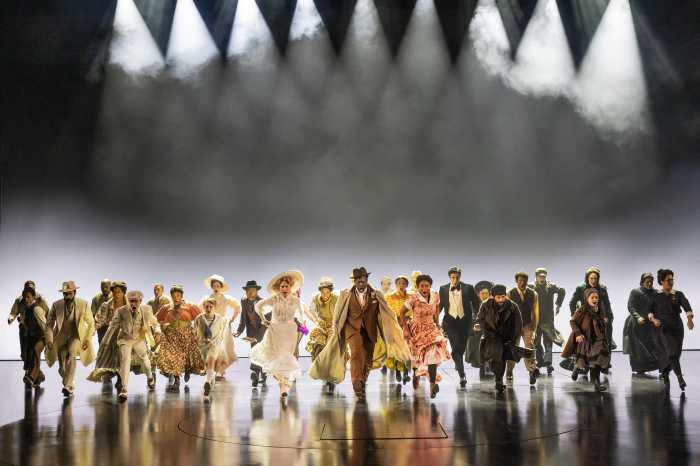If you go: ‘Hershey Felder as Irving Berlin’ runs through Oct. 28 at 59E59. 59 E. 59th St., 59e59.org.
George Gershwin, Leonard Bernstein, Chopin, Beethoven, Liszt and Tchaikovsky all share the distinction of having been portrayed by the versatile and knowledgeable pianist, writer and actor Hershey Felder in various one-man shows, which Felder has previously described as individual movements within a “Composer Sonata.”
Felder (who tours the country extensively, playing different composers in different cities) now returns to Off-Broadway’s 59E59 with the unapologetically sentimental and enjoyable “Hershey Felder as Irving Berlin,” in which he takes on the persona of the iconic songwriter who was famously described by his colleague Jerome Kern (“Show Boat”) as follows: “Irving Berlin has no place in American music — he is American music.”
The intermission-less show (directed by Trevor Hay, with book and scenic design by Felder) has a simple setup of biography mixed with song. It is set in Berlin’s secluded town house on Beekman Place in the late 1980s on Christmas Eve, right after Berlin has turned 100 years old and his wife of 62 years (former socialite Ellin Mackay) has passed away.
With carolers outside singing one of his best-known holiday anthems (“White Christmas”), Berlin invites (or at least he imagines inviting) them inside and proceeds to tell them his rags-to-riches life saga, from his childhood as a Russian immigrant struggling to survive on the Lower East Side, to becoming the most successful writer of American popular song of the 20th century, to turning into a recluse who feels out of touch with and discarded by a changed country.
Felder (who speaks to the audience as if they are the unseen carolers) frequently moves to the bench of his baby grand piano and proceeds to play through Berlin’s biggest hits as they pop up in chronology, from the breakout hit “Alexander’s Ragtime Band” (which is not really ragtime) to the “Annie Get Your Gun” anthem “There’s No Business Like Show Business” (where we get also get an impression of Ethel Merman’s distinctively forceful vocal delivery).
When it comes to “White Christmas” and “God Bless, America” (which Berlin wrote in 1918 and kept hidden in the drawer for 20 years), Felder signals to the audience to sing it in his place.
Whereas Felder’s hands effortlessly glide along the piano keys, Berlin could barely play the piano and even required a mechanically reconfigured one with a level in order to play in different keys (his so-called “Buick”). Recognizing this incongruity, Felder suggests that we are hearing the music as it would have sounded in Berlin’s head.
In addition to tacking on a thick New York accent, Felder portrays Berlin with a restless intensity, suggesting Berlin’s determination to succeed, fervent patriotism, love for his family and anger at becoming a casualty of the rock and roll revolution.
Even though the show is constructed in a by-the-number fashion, and the writing can be heavy-handed and overloaded with exposition, it is truly engrossing and heartfelt. Oddly enough, it also represents the modern jukebox musical at its most simple, persuasive and dramatically effective levels.
Berlin’s story also reverberates in the current political atmosphere. Although he was an immigrant, Berlin wrote “God Bless, America” and came to embody the American dream. He was also a Jew who wrote “White Christmas” and “Easter Parade.” Who knows who the next Irving Berlin will be or where he or she will come from?





































